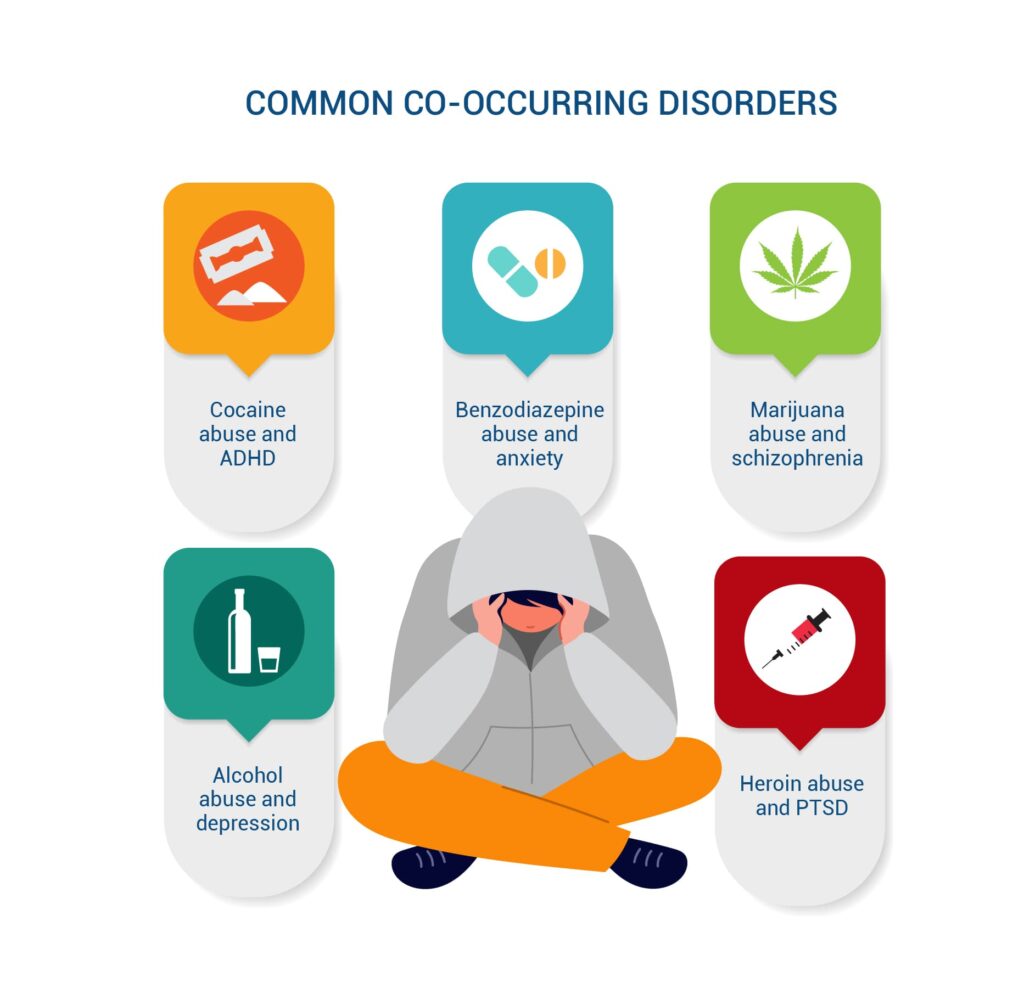What Are Co-Occurring Disorders? Symptoms & Treatment
Co-occurring disorders are defined as any combination of mental health conditions that a person is experiencing at the same time. In the world of drug addiction treatment, co-occurring disorders may be worsened by the withdrawal and detoxification process, and they may also put a person at a higher risk of relapse.
If you or a loved one are suffering from co-occurring disorders, but you’d like to seek treatment for substance abuse, know that it’s possible to address your dual diagnoses without interrupting your recovery. Here’s what you need to know.

What is a Co-Occurring Disorder?
A co-occurring disorder is any combination of two or more disorders that a person is facing at the same time. For instance, if you are already facing a substance use disorder and you have anxiety, depression, or bipolar disorder, you are suffering from co-occurring disorders.
Co-occurring disorders are greatly emphasized when discussing drug abuse due to one fact: addiction, withdrawal, detox, and recovery are all closely intertwined with co-occurring disorders in nearly every situation.
For example, someone suffering from anxiety might be compelled to self-medicate, leading to substance misuse. Now, they have a co-occurring disorder of anxiety and substance use disorder. Anxiety may be the root cause of the substance use disorder, but now a complex treatment plan will be required to ensure one does not worsen the other.
For someone who has anxiety and substance use disorder, quitting a substance could worsen their anxiety. Even for people who don’t suffer from anxiety, the withdrawal and detoxification process often induces anxiety, at least in the short term. That’s why co-occurring disorders should shape your treatment plan.
Beyond anxiety, other co-occurring disorders that will impact how you detox and recover from substance use include depression, schizophrenia, bipolar disorder, and more. In short, any mental illness deserves careful attention for someone pursuing drug recovery.

The Role of Co-Occurring Disorders in Treatment
Whenever someone is admitted to a facility for substance use disorders, the first thing they should be asked is whether they have any other mental or behavioral health concerns. If you enter a facility and a provider does not ask you this question to inform your treatment program, you should seek out experienced clinicians who can adjust your plan accordingly.
Without knowing about co-occurring disorders, it’s impossible for any practitioner to deliver integrated treatment that prioritizes your mental, emotional, and physical health. What’s more, without knowledge of co-occurring disorders, there will likely be risk factors they did not consider, including long-term implications if the detox process is not approached correctly.
To ensure substance abuse treatment is successful and reduces the chance of relapse, you should tell your treatment provider of any disorders you have or think you may have. Whether or not you’ve been officially diagnosed, inform your provider about symptoms of depressive disorder, generalized anxiety disorder, eating disorders, mood disorders, and other mental health issues you’re currently experiencing or have experienced over the past few years.
How Are Co-Occurring Disorders Addressed?
By making your treatment team aware of co-occurring disorders, you will accomplish two things. First, they will take any associated risk factors into account to make sure that the drug detoxification and drug recovery process go as smoothly as possible, reducing discomfort and lowering your risk of relapse.
However, treatment facilities don’t just aim to “work around” your co-occurring disorders as they treat your drug or alcohol addiction. Rather, they aim to treat your co-occurring disorders simultaneously, starting with your substance use disorder and also addressing any other medical condition you made them aware of.
Treatment for co-occurring disorders may consist of a range of interventions as people with co-occurring disorders often need additional support. For instance, if certain environmental factors are a trigger for one of your disorders, hospitalization in an inpatient treatment facility may be advisable.
Ultimately, what dual diagnosis treatment looks like varies from one individual to the next. What’s most important to remember is that a substance use problem or alcohol use disorder are very real mental health conditions and are worthy of the utmost care.
What Are the Dangers of Co-Occurring Disorders?
If you have a co-occurring disorder, it will be front-and-center to the recovery process from the moment you enter detox. If you have certain conditions that would amplify the typical effects of withdrawal or put you at risk of worsened or long-term changes to your health, it’s highly likely that your provider will suggest a medical detox.
While the drug detoxification process is a natural and unavoidable part of recovery, a medical detox will utilize various proven medications and therapies to ease the discomfort. For instance, the detox process often results in intense cravings, mood swings, and anxiety.
Those with a pre-diagnosed anxiety disorder may suffer greatly if their detox is not supported in other ways. Those with a condition like post-traumatic stress disorder may find that the detox isn’t just more uncomfortable, but their condition worsened in the long term, especially when common feelings like helplessness are triggered.
Failing to accommodate for co-occurring disorders during the detoxification process can lead to long-term health implications, not to mention a higher chance of relapse if a person is trying to detox on their own, without medical supervision. Additionally, co-occurring disorders will continue to be addressed long after detox.
Throughout the recovery process, your team should be working with you to understand how your co-occurring disorders are impacting you and perhaps worsening your symptoms. For instance, even those with no history of schizophrenia may experience psychosis when recovering from a severe addiction to a substance like opioids. It is paramount that their team anticipates these common side effects and finds ways to mitigate them.
This calls for a team that’s highly familiar with the conditions you are facing so that they can shape your treatment around the side effects, triggers, and concerns you have for your mental and physical health. If you ever feel like you aren’t being heard or understood, remember to advocate for yourself and find a team that is going to support you through the process.
What Are the Treatment Options for Dual Diagnosis?
If you have a dual diagnosis for substance use disorder and any other disorder, you have a number of treatment options available. Generally, you’ll begin by finding a facility that specializes in substance use disorder. Based on the severity of your other conditions, you’ll need to compare the types of treatment you will receive at different treatment centers.
Here’s a brief overview of how your care may be approached if you have a co-occurring disorder:
- Inpatient programs like hospitalization are most commonly recommended for those seeking substance use disorder treatment when they are also experiencing other disorders. These programs tend to offer more acute, short-term treatment before transitioning out into one of the lower levels of care, listed below.
- Residential facilities are also considered inpatient, but not in a hospital environment. Residential facilities consist of living in a home-like environment with others who are recovering from drug use. Not all residential facilities have the specialized support staff you may need to address your dual diagnosis, so it’s important that you ask.
- Partial hospitalization programs are offered as a step-down from inpatient level of care. They are designed to maintain structure and continue the recovery process in a safe environment. Residing in housing provided by the treatment center or at home, patients will attend group therapy 5-6 days per week.
- Intensive outpatient programs provide more flexibility than the above options because they allow you to continue living at home. However, these programs are only effective if you have a safe home environment and a strong support network. You’ll also need to be able to attend multiple appointments each week for group, solo, and/or family therapy, and for visits with specialists.
- Outpatient programs are the least intensive of all treatment paths, and they are not safe or effective for those dealing with serious mental illness. An outpatient program may be loosely structured and so, while more flexible, it requires major commitment on the part of the patient. Generally, this type of treatment is most common for adolescents living at home with a supportive family.
If you’re trying to decide which treatment option is best for you, it’s time to speak with a knowledgeable and caring specialist who can guide you in the right direction. Reach out to Zinnia Health today to understand your options and get on the path to recovery.
How Dual Diagnosis Treatment Works
There is no one-size-fits-all approach to dual diagnosis treatment. Generally, those with co-occurring disorders will opt for either an inpatient or residential treatment facility, as both options provide 24-hour care from staff who fully understand your conditions and needs.
In either of these programs, you’ll sit down with a specialist who will construct a customized treatment plan that utilizes the various services and practitioners on-site at the facility. Most often, you will participate in a variety of group, individual, and family therapy sessions. Additionally, you’ll meet with specialists based on your specific conditions.
Cognitive behavioral therapy is almost always utilized in the treatment of a substance use disorder because it is fundamental in changing your behavior and helping you control impulse, overcome your addiction, and avoid relapse.
Based on your needs and preferences, you might also be introduced to holistic therapies, such as massage therapy, which can be good for relaxation and pain management; physical therapy, which can improve fitness, self-image, self-respect, and self-confidence; and skills training, which can help prepare you to transition into a healthy lifestyle where you are more active in your community.
Beyond these general guidelines, your treatment plan could take on any shape. It’s also going to adapt as you progress through your treatment, identifying that some therapies are more valuable to you than others or that one thing you thought you would struggle with, such as increased anxiety, has actually improved tremendously.
Ultimately, what matters is that you’re working with a team of professionals who check in with you regularly and adapt your treatment plan accordingly to make sure you’re getting the absolute best care at every stage of recovery. Additionally, once you have officially “completed” your treatment plan, they should develop an aftercare program to help you manage your conditions, avoid relapse, and continue working towards your goals.
Take The First Step Towards Treatment
Co-occurring disorders have a complex relationship where one can worsen the other. For anyone seeking help with substance use disorder, it’s crucial to work with a team that will discuss your past and current symptoms, help you receive an official diagnosis for any existing disorders, and give you the best possible treatment based on your unique needs.
Are you ready to take the next step towards dual diagnosis recovery? At Zinnia Health, our caring staff are dedicated to helping individuals overcome their substance use issue and get on the path to learning new coping methods and tools that will allow them to lead the life they want. Reach out to Zinnia Health today for more information.

